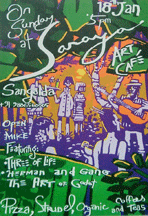First Altercation with the British East India Company
The new Faujdar of Hugli, Pir Khan (Shuja Quli Khan), commenced exactions and oppressions. The Port of Hugli from his acts of ommision and commision was ruined; and he commenced quarrelling with the European merchants. On the pretext of collecting the customs-duties of the Imperial Customs House, he requisitioned troops from the Emperor, commenced hostility with the English, Dutch, and French, and levied Nazars and taxes. It is said that once while unloading from English vessels bales of silk and cotton, and placing these below the fort he unfairly confiscated them. The English troops advancing from Calcutta, arrived near the fort. Pir Khan finding himself an unequal match for them climbed down, when the English troops carried off their goods. The aforesaid Khan; writing to Nawab Shuja ud-Daulah requisitioned troops to attack the English and by cutting off supplies of Qasimbazar (Cossimbazar / Cassimbazar) and Calcutta, he reduced them to straits. The Chief of the English Factory at Qasimbazar was compelled in consequence to arrange terms of peace, by agreeing to pay three lakhs (three hundred thousand) of rupees as nazar to the Nawab. The Chief of the English Factory in Calcutta, borrowing the nazarana money from the Calcutta bankers, remitted it to Murshidabad.
Personality
Shuja-ud-Din is remembered as the most successful Nawab of Bengal who ushered in a reign of "rare" prosperity in Bengal, in the 18th century. He had the experience and the tact to handle a vast array of circumstances and learnt well from Murshid Quli Khan. He was known to be shrewd, firm, a well educated and well mannered person. He started an era of secularism in Bengal (in the 18th century) wherein, realizing their potential, very important positions were given to Hindus. While Murshid Quli hailed from the "Aurangzeb school of thought", Shuja was more of a realist, practical and a mild mannered person.[2]
Siyar-ul-Mutakherin by Mir Gholam Hussein-Khan Tabtabai (translated into English by Lieutenant Colonel John Briggs, M.R.A.S., The British East India Company (Madras Army) in May, 1831.) notes that the reign of Nawab Shuja-ud-din Muhammad was one of the best (twelve) years of the 18th century for the Subah of Bengal. Well known to be a mild, just, secular and God fearing person Shuja was always interested in learning, jurispudence and meeting new people who visited Murshidabad from other parts of the world. He was an able adminitrator and was tactful in dealing with the Mughal Emperor, Nawab of Oudh, Marathas, East India Company, his ambitious Nazims, his own son Sarfaraz Khan and ensured proper checks, balances and controls. He was vastly popular among his subjects as well as with the Mughal Emperor Muhammad Shah.
It is important to note that Shuja never engaged in conflict but managed his resources and manpower well enough to posture, never to attack. He had at his disposal the richest province in the country but had "problems" like Oudh, marauding Marathas and a weak Mughal Emperor. He preferred sending "supplies" to Delhi rather than "armies" to fight for the declining Mughals. He had advised caution while dealing with Nadir Shah and adopted a "hands off" approach on learning that Nadir had left Persia for Delhi. He however kept on sending a part of his revenue collection to Delhi and unlike the Nawab of Oudh kept away from the court intrigues in the Red Fort.
Death and Succession
After his death (of natural causes) in 1739, leaving behind two sons and two daughters. He was succeeded by his son Sarfaraz Khan. He lies buried in Roshnibag in Murshidabad. His death coincided with the invasion of Delhi by Nadir Shah.
Shuja-ud-Din left behind a very rich and prosperous Bengal to a very average successor, Sarfaraz Khan who had contenders (certainly) better than him. The Nasiri Dynasty lasted for another thirteen months and ended with Sarfaraz Khan.
Trivia
It is believed that during the rule of Shuja-ud-Din Muhammad Khan, rice sold at eight "maunds" to the "rupiyah" or rupee. During Murshid Quli's time, rice sold at five "maunds" to the "rupiyah" or rupee.
Ali Vardi Khan
Ali Vardi Khan was the Nawab of Bengal between 1740 and 1756.
Birth
Ali Vardi was born on the10 May 1671. He was named Mirza Muhammad Ali, the son of Shah Quli Khan Mirza Muhammad Madani and the daughter of Nawab Aqil Khan Afshar .
Official name
His official title was Shuja ul-Mulk, Husam ud-Daula, Nawab Muhammad Alahvirdi Khan Bahadur, Mahabat Jang, Nawab Nazim of Bengal, Bihar and Orissa.
Life
He was a Shiite Muslim and his father Mirza Muhammad Madani was an employee of Azam Shah, the son of Mughal emperor Aurangzeb. Azam Shah also employed the sons of Mirza Muhammad, but after the death of Azam Shah the family fell into poverty.
His two sons Muhammad Ali and Mirza Ahmed managed to find employment under Orissa's Subdedar Suza-ud-Din. After Suza-ud-din was promoted to nawab the two brothers' future prospects widened. In 1728, Suza-ud-din promoted Muhammad Ali to ‘Fauzdar’ (General) and entitled him as Ali Vardi. In 1733, he was assigned as Bihar’s assistant Subedar (governor).
Rise to power
Ali Vardi Khan however wanted to become the ruler of Bengal himself, on 29 April 1740 he deposed Shuja-ud-din's succesor, Sarfaraz Khan from power, becoming Nawab of Bengal and also got recognition from Mughal emperor Muhammad Shah.
Reign
During his reign Bengal was attacked twice by the Nagpur Kingdom under Raghoji I Bhonsle in 1746 and 1750. This caused the loss of Cuttack to Nagpur in 1750.
Death
He died in 16 April 1756. His grandson Siraj-ud-Daula succeeded Ali Vardi Khan as the Nawab of Bengal in April 1756 at the age of 23.
Siraj ud din Daulah
Mîrzâ Mohammad Sirâjud Dawla, (Persian:مرزا محمد سراج الدولہ,Bengali: নবাব সিরাজদৌল্লা ) more commonly known as Siraj ud-Daulah (1733 – July 2, 1757), was the last independent Nawab of Bengal, Bihar and Orissa. The end of his reign marks the start of British East India Company rule over Bengal and later almost all of South Asia. He was also called "Sir Roger Dowlett" by many of the British who were unable to pronounce his name correctly in Hindustani.
Early years
Siraj's father Zain Uddin was the ruler of Bihar and his mother Amina Begum was the youngest daughter of Nawab Ali Vardi Khan. Since Ali Vardi had no son, Siraj, as his grandson, became very close to him and since his childhood was seen by many as successor to the throne of Murshidabad. Accordingly, he was raised at the nawab's palace with all necessary education and training suitable for a future nawab. Young Siraj also accompanied Ali Vardi in his military ventures against the Marathas in 1746.
Ali Vardi Khan in 1752 officially declared his grandson Crown Prince and successor to the throne, creating no small amount of division in the family and the royal court.
Reign as Nawab
Mirza Mohammad Siraj succeeded Ali Vardi Khan as the Nawab of Bengal in April 1756 at the age of 23, and took the name Siraj-Ud-Daulah. Siraj-Ud-Daulah's nomination to the nawabship aroused the jealousy and enmity of Ghaseti Begum (the eldest sister of Siraj's mother), Raja Rajballabh, Mir Jafar Ali Khan and Shawkat Jang (Siraj's cousin). Ghaseti Begam possessed huge wealth, which was the source of her influence and strength. Apprehending serious opposition from her, Sirajuddaula seized her wealth from Motijheel Palace and placed her in confinement. The Nawab also gave high government positions to his favourites. Mir Mardan was appointed Bakshi (Paymaster of the army) in place of Mir Jafar. Mohanlal was elevated to the post of peshkar of his Dewan Khana and he exercised great influence in the administration. Eventually Siraj suppressed Shaukat Jang, governor of Purnia, who was killed in a clash.
Black Hole of Calcutta
Main article: Black Hole of Calcutta
He, as the direct political disciple of his grandfather, was aware of the global British interest in colonization and hence, resented the British politico-military presence in Bengal represented by the British East India Company. He was annoyed at the company's alleged involvement with and instigation of some members of his own court in a conspiracy to oust him. His charges against the company were mainly threefold. Firstly, that they strengthened the fortification around the Fort William (India) without any intimation and approval; secondly, that they grossly abused the trade privileges granted to them by the Mughal rulers, which caused heavy loss of customs duties for the government; and thirdly, that they gave shelter to some of his officers, for example Krishnadas, son of Rajballav, who fled Dhaka after misappropriating government funds. Hence, when the East India Company started further enhancement of military preparedness at Fort William in Calcutta, Siraj asked them to stop. The Company did not heed his directives, so Siraj-Ud-Daulah retaliated and captured Kolkata (Shortly renamed as Alinagar) from the British in June 1756. During this time, he is alleged to have put 146 British subjects in a 20 by 20 foot chamber, known as the infamous Black Hole of Calcutta; only 23 were said to have survived the overnight ordeal. The real facts around the incident are disputed by later historians, but at that time the lurid account of this incident by one survivor - Holwell - obtained wide circulation in England and helped gain support for the East India Company's continued conquest of India.
The Battle of Plassey
The Battle of Plassey (or Palashi) is widely considered the turning point in the history of India, and opened the way to eventual British domination. After Siraj-Ud-Daulah's conquest of Calcutta, the British responded by sending fresh troops from Madras Chennai to recapture the fort and avenge the attack. A retreating Siraj-Ud-Daulah met the British at Plassey, but betrayed by a conspiracy hatched by Jagat Seth, Mir Jafar, Krishna Chandra, Umi Chand etc, he lost the battle and had to escape. He went first to Murshidabad and then to Patna by boat, but was eventually arrested by Mir Jafar's soldiers. Siraj-Ud-Daulah was executed on July 2, 1757 by Mohammad Ali Beg under orders from Mir Jafar.
Robert Clive, 1st Baron Clive, meeting with Mir Jafar after Plassey, by Francis Hayman
The character of Siraj-Ud-Daulah
The neutrality of this section is disputed. Please see the discussion on the talk page. Please do not remove this message until the dispute is resolved. (June 2009)
Siraj-Ud-Daulah is usually proclaimed as a freedom fighter in modern India, Bangladesh, and Pakistan for his opposition to the British annexation. As a teenager, he led a reckless life, which came to the notice of his grandfather. But keeping a promise he made to his dear grandfather on his death bed, he gave up gambling and drinking alcohol totally after becoming the nawab. He was a fierce fighter against the Marathas and the pirates of Southern Bengal as a prince during 1740s, but his forces were later totally routed by the greatly outnumbered British.
"Siraj-ud-daula has been pictured", says the biographer of Robert Clive, "as a monster of vice, cruelty and depravity.". In 1778, Robert Orme wrote of the relationship with his maternal grandfather Ali Vardi Khan:
"Mirza Mahmud Siraj, a youth of seventeen years, had discovered the most vicious propensities, at an age when only follies are expected from princes. But the great affection which Allaverdy [Ali Vardi] had borne to the father was transferred to this son, whom he had for some years bred in his own palace; where instead of correcting the evil dispositions of his nature, he suffered them to increase by overweening indulgence: taught by his minions to regard himself as of a superior order of being, his natural cruelty, hardened by habit, in conception he was not slow, but absurd; obstinate, sullen, and impatient of contradiction; but notwithstanding this insolent contempt of mankind,the confusion of his ideas rendered him suspicious of all those who approached him, excepting his favourites, who were buffoons and profligate men, raised from menial servants to be his companions: with these he lived in every kind of intemperance and debauchery, and more especially in drinking spiritous liquors to an excess, which inflamed his passions and impaired the little understanding with which he was born. He had, however, cunning enough to carry himself with much demureness in the presence of Allaverdy, whom no one ventured to inform of his real character; for in despotic states the sovereign is always the last to hear what it concerns him most to know."
Two Muslim historians of the period wrote of him, and both made specific mention of his exceptional cruelty and arrogance.
Ghulam Husain Salim wrote[1]:
"Owing to Siraj ud Dowla’s harshness of temper and indulgence, fear and terror had settled on the hearts of everyone to such an extent that no one among his generals of the army or the noblemen of the city was free from anxiety. Amongst his officers, whoever went to wait on Siraj ud Dowla despaired of life and honour, and whoever returned without being disgraced and ill-treated offered thanks to God. Siraj ud Dowla treated all the noblemen and generals of Mahabat Jang [Ali Vardi Khan] with ridicule and drollery, and bestowed on each some contemptuous nickname that ill-suited any of them. And whatever harsh expressions and abusive epithet came to his lips, Siraj ud Dowla uttered them unhesitatingly in the face of everyone, and no one had the boldness to breath freely in his presence."'
Ghulam Husain Tabatabai had this[2] to say about him:
"Making no distinction between vice and virtue, he carried defilement wherever he went, and, like a man alienated in his mind, he made the house of men and women of distinction the scenes of his depravity, without minding either rank or station. In a little time he became detested as Pharaoh, and people on meeting him by chance used to say, ‘God save us from him!'"
| < Prev | Next > |
|---|
















